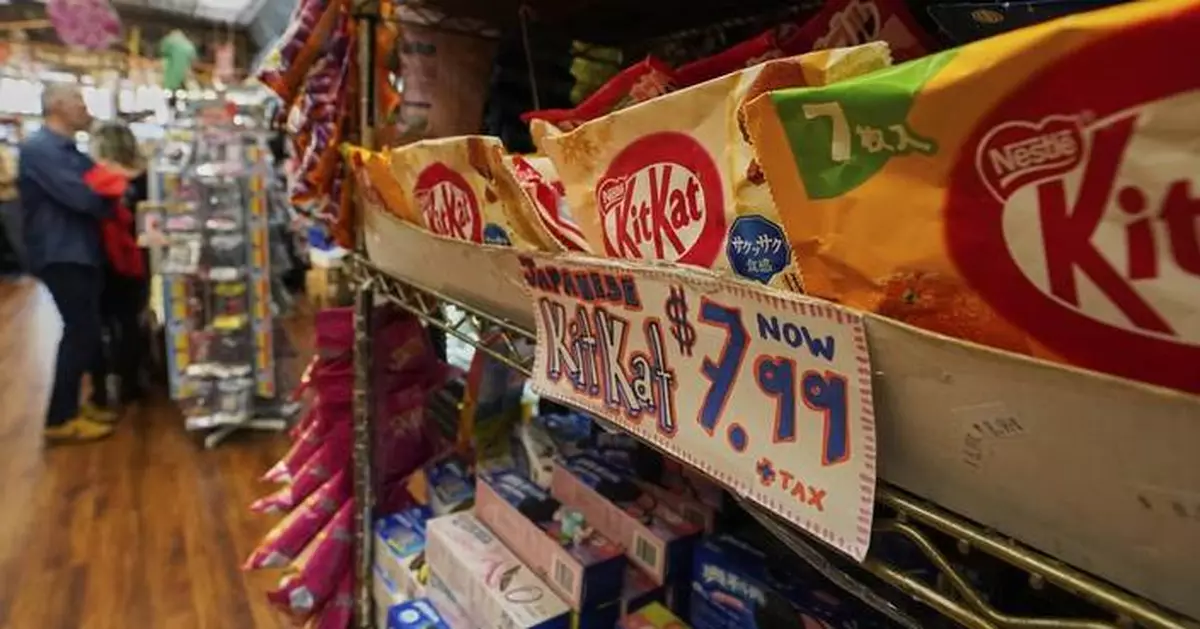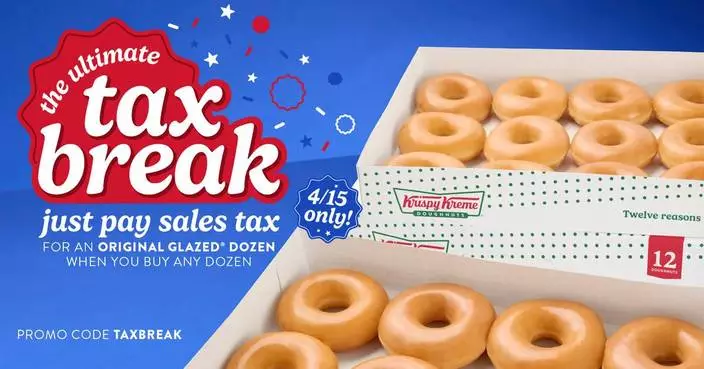NEW YORK (AP) — Economy Candy’s shelves brim with sweets from around the world – gummies from Germany, lollipops from Spain, chocolates from Japan and a panoply of candies from across the U.S.
Standing amid it all, columns of bright jellybeans to his left and exotic Kit Kats to his right, owner Mitchell Cohen is quick with his assessment of how many of this shop’s 2,000-plus items are affected by the historic round of tariffs announced by President Donald Trump.
Click to Gallery
Shoppers visit Economy Candy in New York's Lower East Side, Friday, April 4, 2025. (AP Photo/Richard Drew)
Candies from around the world are displayed for sale at Economy Candy in New York's Lower East Side, Friday, April 4, 2025. (AP Photo/Richard Drew)
A shopper at Economy Candy chooses Skittles from Japan, at the shop on New York's Lower East Side, Friday, April 4, 2025. (AP Photo/Richard Drew)
Milka chocolate bars from Germany are displayed for sale at Economy Candy in New York's Lower East Side, Friday, April 4, 2025. (AP Photo/Richard Drew)
A shopper chooses Haribo candy from Germany, at Economy Candy on New York's Lower East Side, Friday, April 4, 2025. (AP Photo/Richard Drew)
A shopper looks at Haribo candies from Germany, at Economy Candy on New York's Lower East Side, Friday, April 4, 2025. (AP Photo/Richard Drew)
Snickers bars from Brazil are displayed for sale at Economy Candy in New York's Lower East Side, Friday, April 4, 2025. (AP Photo/Richard Drew)
Kit Kats from Japan are displayed for sale at Economy Candy in New York's Lower East Side, Friday, April 4, 2025. (AP Photo/Richard Drew)
Kit Kats from Japan are displayed for sale at Economy Candy in New York's Lower East Side, Friday, April 4, 2025. (AP Photo/Richard Drew)
“I think all of them,” Cohen says at his store on New York's Lower East Side.
Few corners of the American economy are untouched, directly or indirectly, by the sweeping tariffs being imposed by Trump. Even a little store like Economy Candy.
Cohen had just begun to feel a barrage of inflation-driven price increases from suppliers ease when the tariff threats arrived. For a business with a name like Economy Candy, he wants to remain affordable but fears how high some prices may have to climb in the coming months.
“I think it’s gonna be another round of this hyperinflation on some items,” says 39-year-old Cohen. “If we’re putting tariffs everywhere, it is going to go up.”
Stepping into Economy Candy feels like a time warp. Its name is emblazoned on a sign in a vintage, blaring red script, and crossing below its green-and-white striped awning, past the bins of Smarties, butterscotches and Lemonheads in the front window, an indecipherable sweetness fills the air, oldies music sounds overhead and customers mill around stacks of candy bars they forgot still existed.
It represents just a blip in the country’s $54 billion candy industry. But it was already feeling the weight of surges in prices of cocoa and other ingredients before tariffs were layered on.
Candy and gum prices are up about 34% from five years ago and 89% from 2005, according to Consumer Price Index data. Price, according to the National Confectioners Association, has become the top factor in consumers’ candy purchase decisions, outweighing a buyer's mood.
About a third of Economy Candy’s products are imported, crowded on shelves and tables near the store’s rear. There aren’t just “more German Haribo varieties than the Haribo store in Germany,” as Cohen claims, but gummies the brand makes in France, Austria and Britain.
They have every Milka bar they can find in Switzerland, every type of Leone hard candies that Italy churns out and as many exotic Kit Kats from Japan as they can fit.
On products like these, the tariffs’ toll is obvious.
Pistachio Snickers bars are from India, now subject to 26% tariffs, while passion fruit mousse Snickers are from Portugal, now under the 20% European Union levies.
But even an American-made Snickers isn’t immune.
While the bars may roll off conveyors in Texas, they rely on ingredients from around the globe. Sourcemap, which tracks supply chains, says Snickers bars include chocolate from Guyana and sugar from Brazil and are wrapped in packaging from Canada. All are now subjected to varying levels of tariffs.
“There’s a lot of ingredients in there that have to come from other countries,” says Andreas Waldkirch, an economics professor at Colby College who teaches a class on international trade. “Unless you’re talking about something very simple from your local farmers market, almost every product relies on ingredients from elsewhere. Those indirect costs are really what’s going to drive up prices.”
The story repeats with American candies across the store – the boxes of Nerds and bags of Sugar Babies and rolls of Smarties are all inextricably tied to the global supply chain.
A table teeming with those domestic delicacies takes center stage near Economy Candy’s entrance. Cohen took over the store from his parents, who took it over from their parents before. He got his first haircut in the store. He was behind the register as a child. He took his wife by on their first date.
As a kid, everything on the store’s centerpiece table of American treats cost 59 cents. By 2020, the price was $1.29, but customers who bought a whole box paid a discounted rate of $1 per piece.
Now, Cohen can’t even get them wholesale at that price.
Today, he sells the items on the table for $1.59. Cohen calls the selection a “loss leader” but thinks it's important to showcase his store's affordability. Once the tariffs are fully implemented, he’s not sure he’ll be able to put off price increases.
“When your margins are coming down and your dollar doesn’t go as far at the end of the day, you really start to feel it,” he says. “But I don’t want anyone to come into Economy Candy and not think that it’s economical.”
The biggest-ticket implications of the tariff blitz understandably gain the most attention – the thousands of dollars a car’s price tag may grow, the tens of thousands that disappear from a retirement account in a single day. But here among the root beer barrels and licorice strands, you're reminded that small-dollar items are affected too, and so are the families selling them.
At its birth, the business Cohen’s grandfather started focused on shoe and hat repairs. But in the wake of the Great Depression, when few in a neighborhood of crowded tenements had money for such fixes, the business pivoted.
Candy, once relegated to a cart out front, took over the store.
In the 88 years since, business hasn't always been Chuckles and Zagnuts. The Sept. 11 attacks kept tourists away and had sales sagging and the pandemic closed the store and forced it to pivot to online sales.
If tariffs upend things, Cohen isn’t sure how he might adapt again. He sells products that aren’t made in America and he sells American products made with ingredients from across the globe. He had just been making headway on beginning international sales, but the web of tariff rules may make it impossible.
The average U.S. tariff could rise to nearly 25% if the import taxes Trump put on goods from dozens of countries are fully implemented Wednesday. That would be the highest rate in more than a century, including tariffs widely blamed for worsening the Great Depression.
Trump said imposing the tariffs amounted to a “liberation day” for a country that has been “looted, pillaged, raped and plundered” by friend and foe alike, insisting it was “very, very good news” for the U.S.
Cohen isn't sure how that can be true for a business like his.
“I can understand bringing manufacturing and bringing things back to America, but you know, we rely on raw materials that just aren’t native to our country,” he says. “And it’s not like I can get a green tea Japanese Kit Kat from an American company.”
As Cohen stood before mounds of strawberry candies in shiny wrappers and little cubes of caramel in cellophane, the first word of the tariff’s concrete impact on him arrived. A French supplier emailed saying it was immediately imposing a 5% surcharge due to the tariffs, expressing regret for the move and hope that “the situation will be resolved swiftly.”
Cohen wore a smile anyway. He wants this to be a happy place for visitors.
“You travel back to a time when nothing mattered,” Cohen says, "when you didn’t worry about anything.”
Matt Sedensky can be reached at msedensky@ap.org and https://x.com/sedensky.
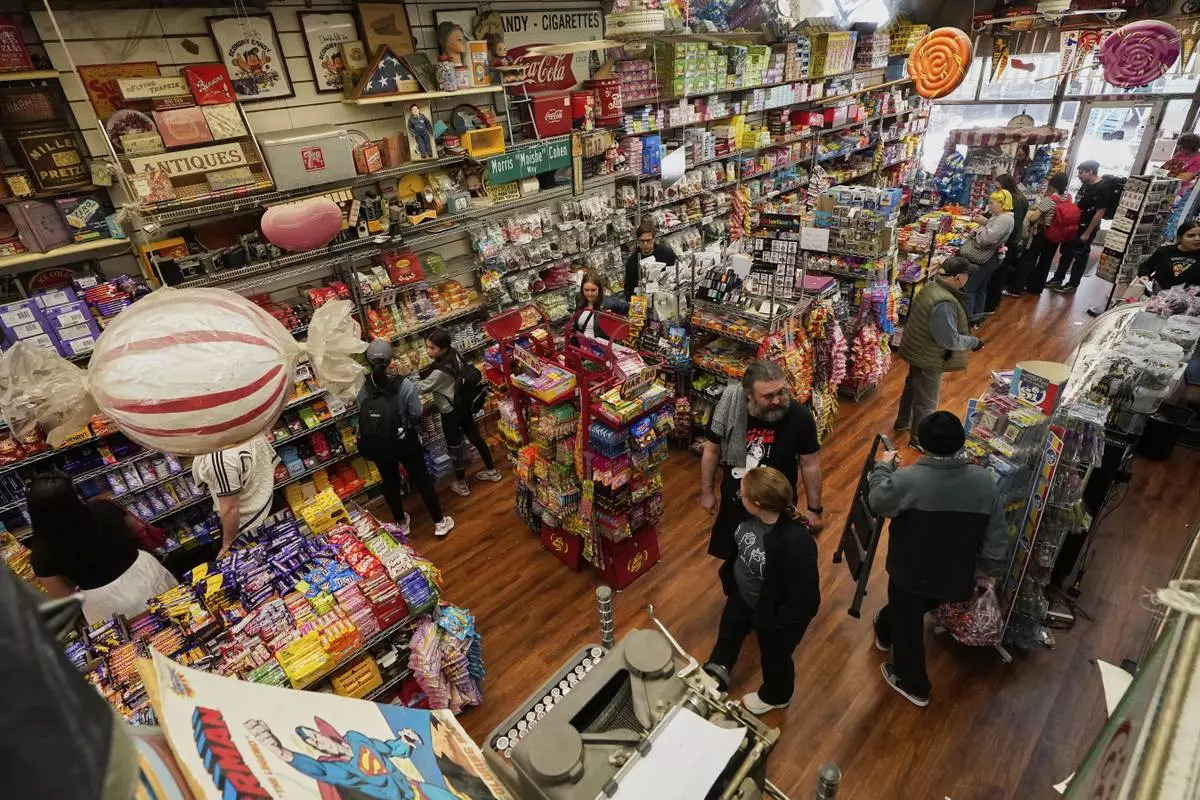
Shoppers visit Economy Candy in New York's Lower East Side, Friday, April 4, 2025. (AP Photo/Richard Drew)
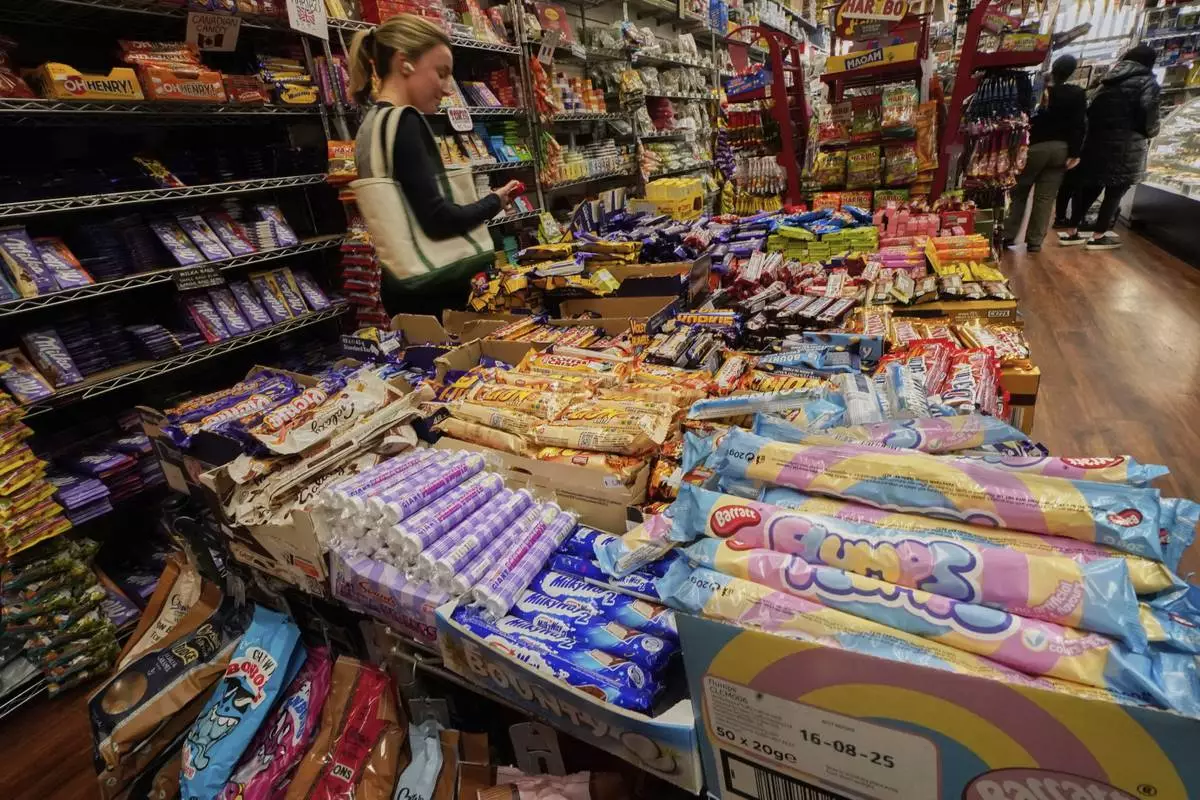
Candies from around the world are displayed for sale at Economy Candy in New York's Lower East Side, Friday, April 4, 2025. (AP Photo/Richard Drew)
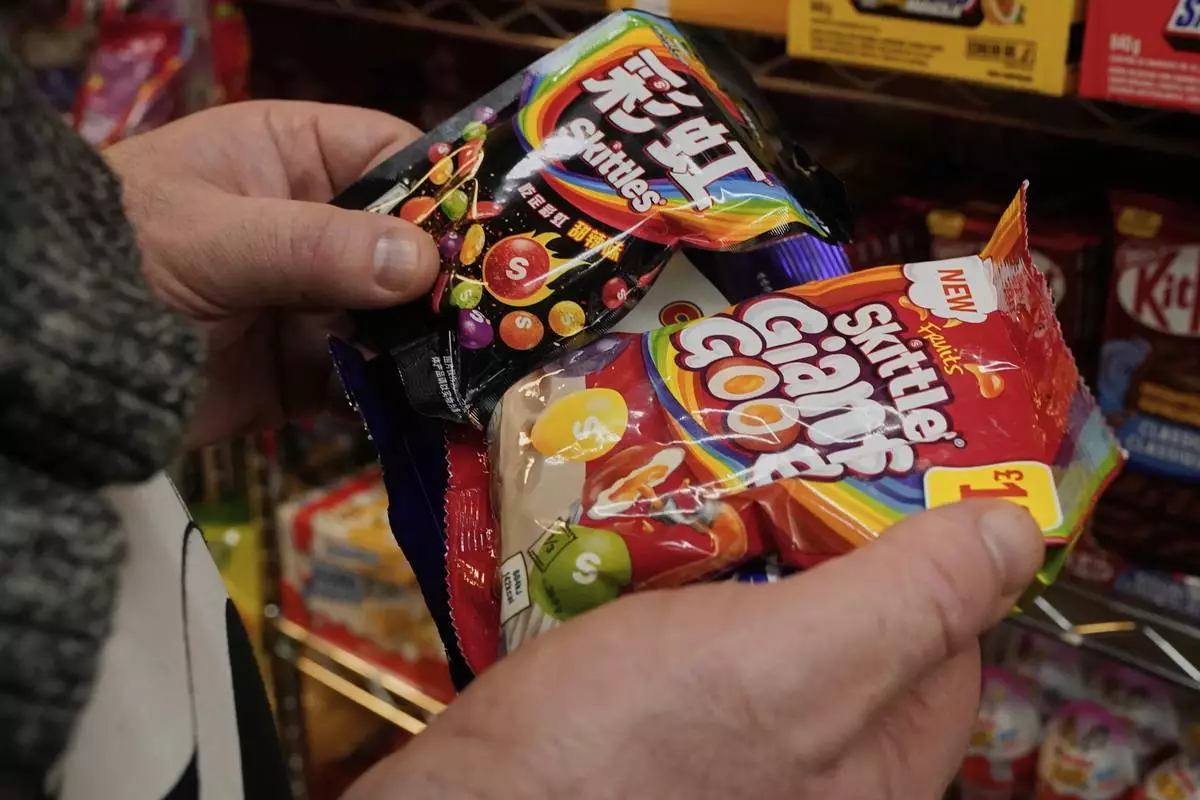
A shopper at Economy Candy chooses Skittles from Japan, at the shop on New York's Lower East Side, Friday, April 4, 2025. (AP Photo/Richard Drew)
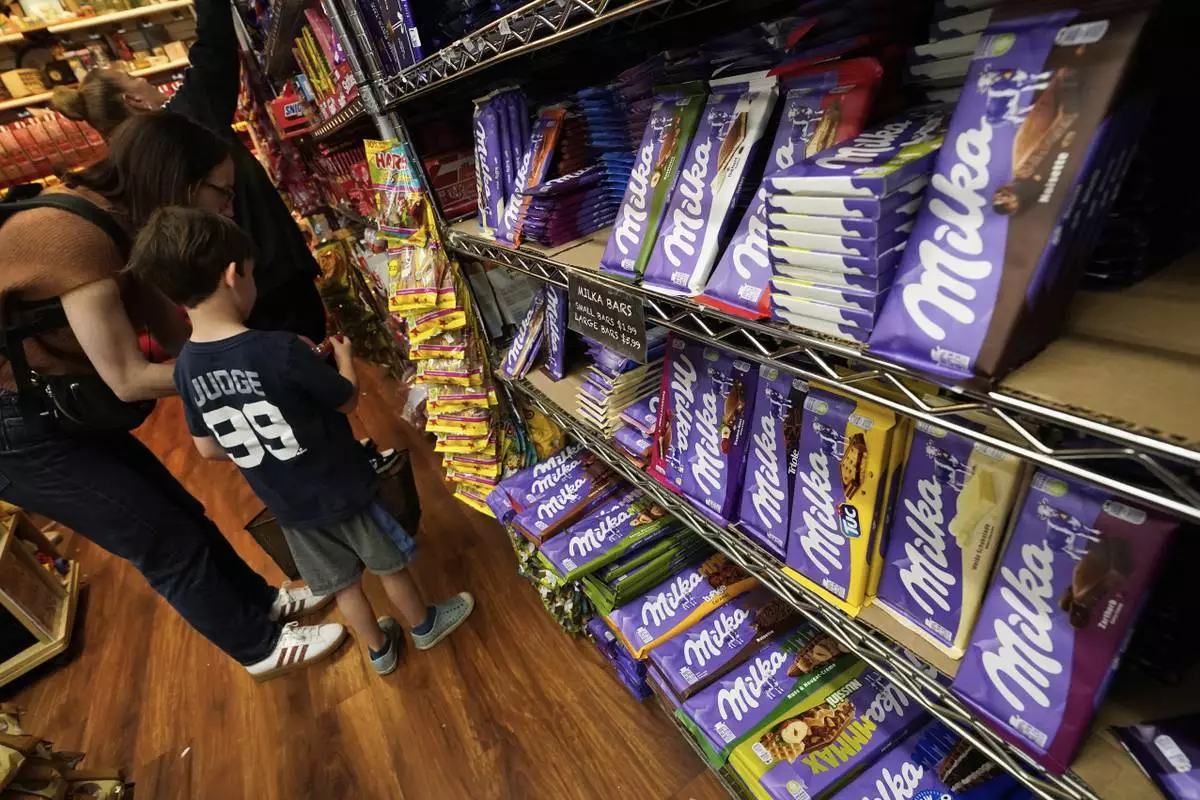
Milka chocolate bars from Germany are displayed for sale at Economy Candy in New York's Lower East Side, Friday, April 4, 2025. (AP Photo/Richard Drew)
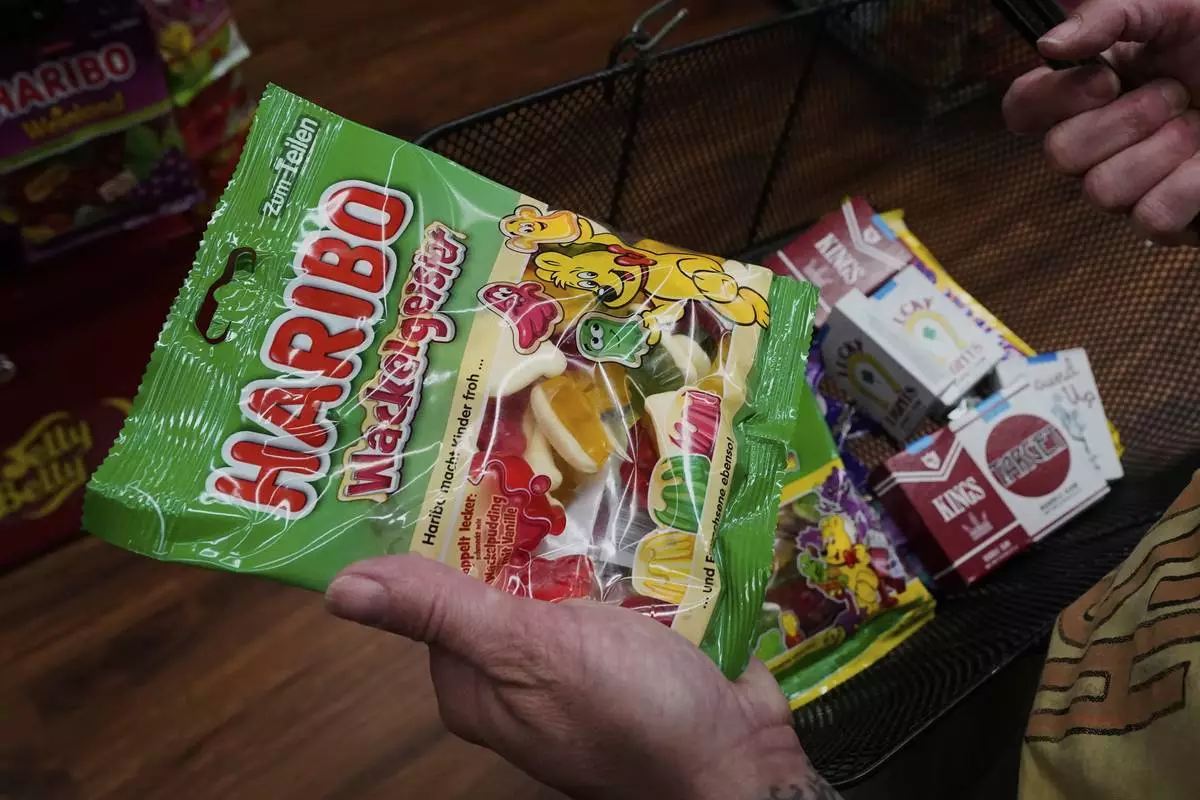
A shopper chooses Haribo candy from Germany, at Economy Candy on New York's Lower East Side, Friday, April 4, 2025. (AP Photo/Richard Drew)
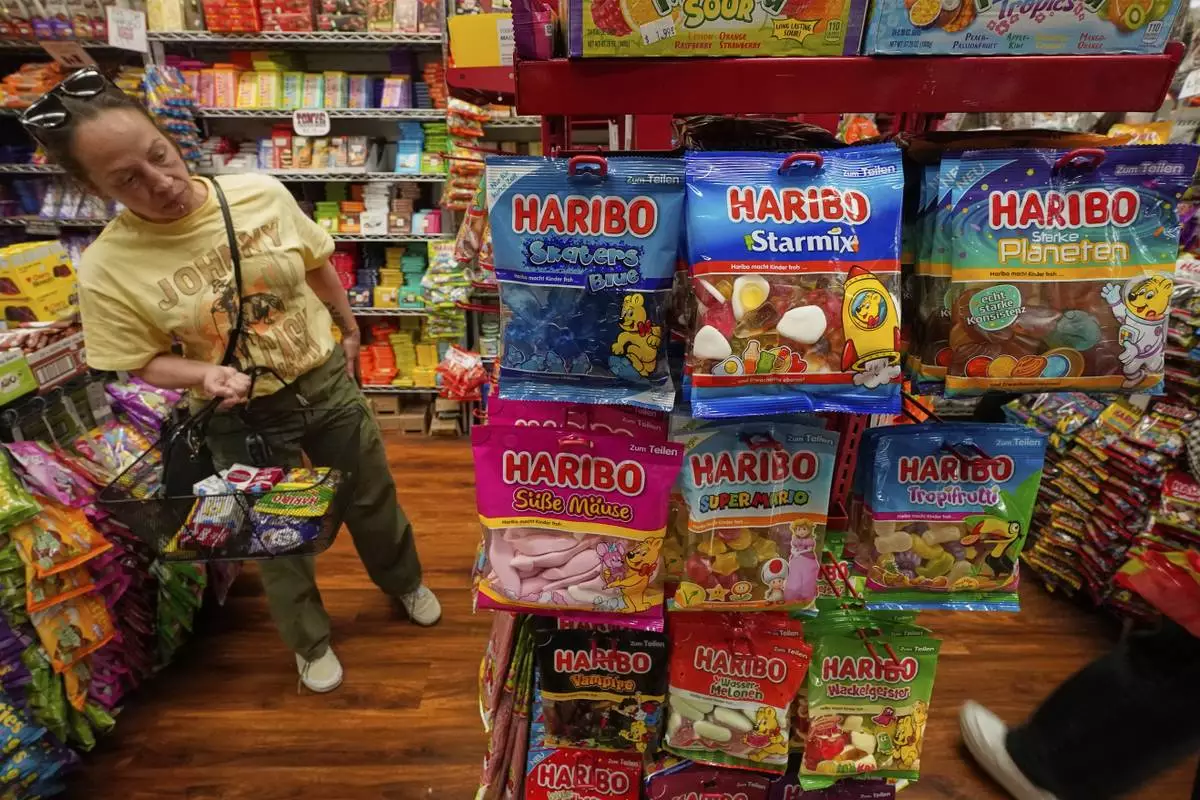
A shopper looks at Haribo candies from Germany, at Economy Candy on New York's Lower East Side, Friday, April 4, 2025. (AP Photo/Richard Drew)
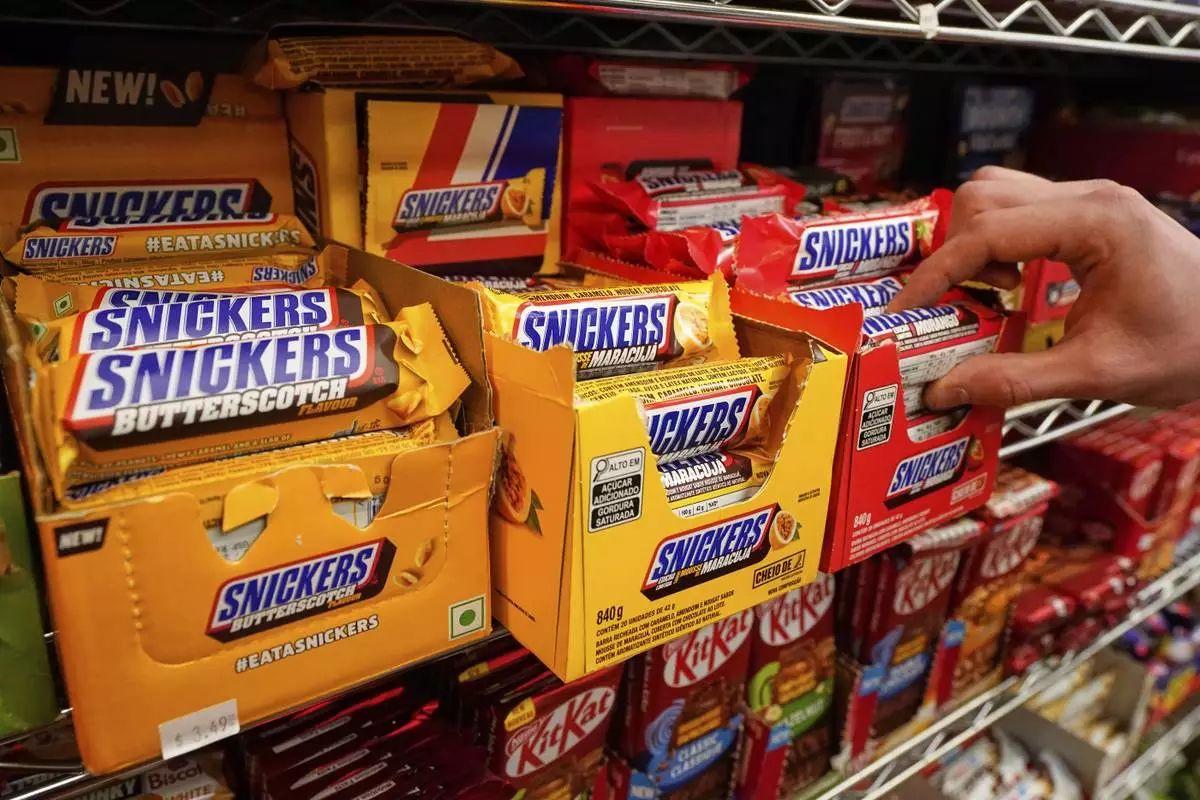
Snickers bars from Brazil are displayed for sale at Economy Candy in New York's Lower East Side, Friday, April 4, 2025. (AP Photo/Richard Drew)
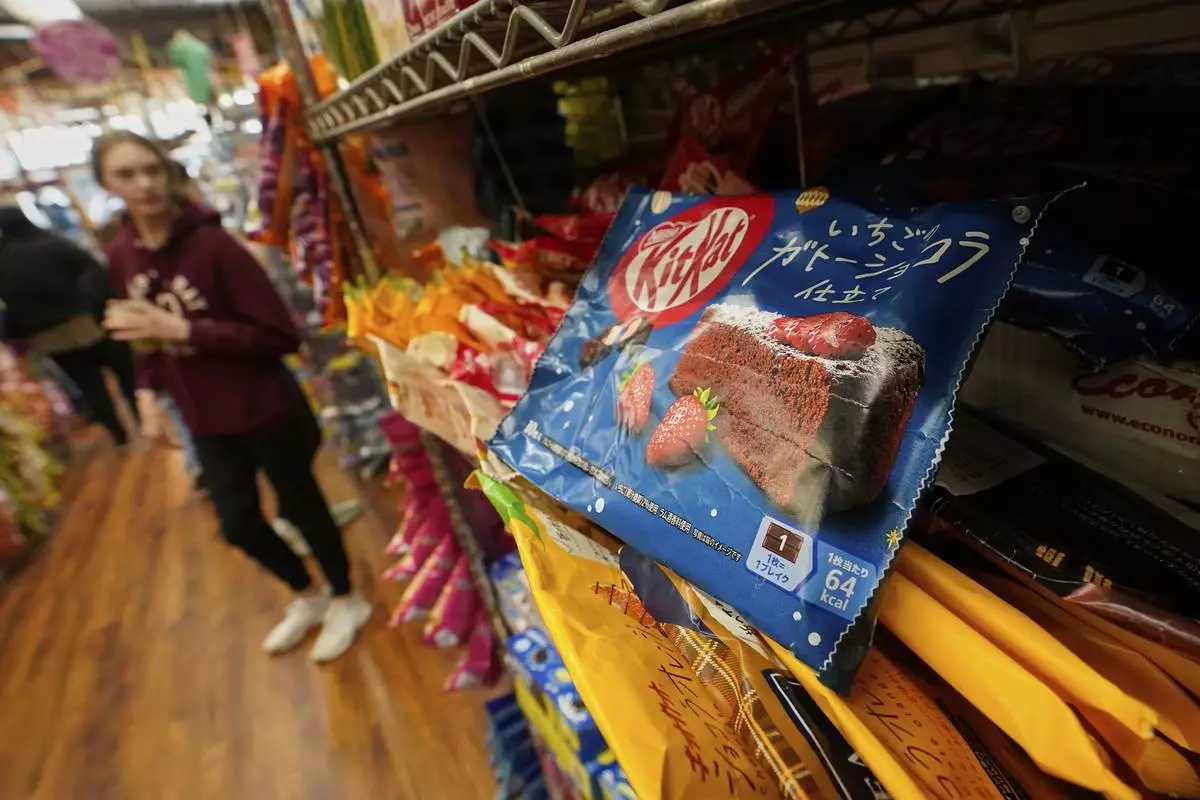
Kit Kats from Japan are displayed for sale at Economy Candy in New York's Lower East Side, Friday, April 4, 2025. (AP Photo/Richard Drew)
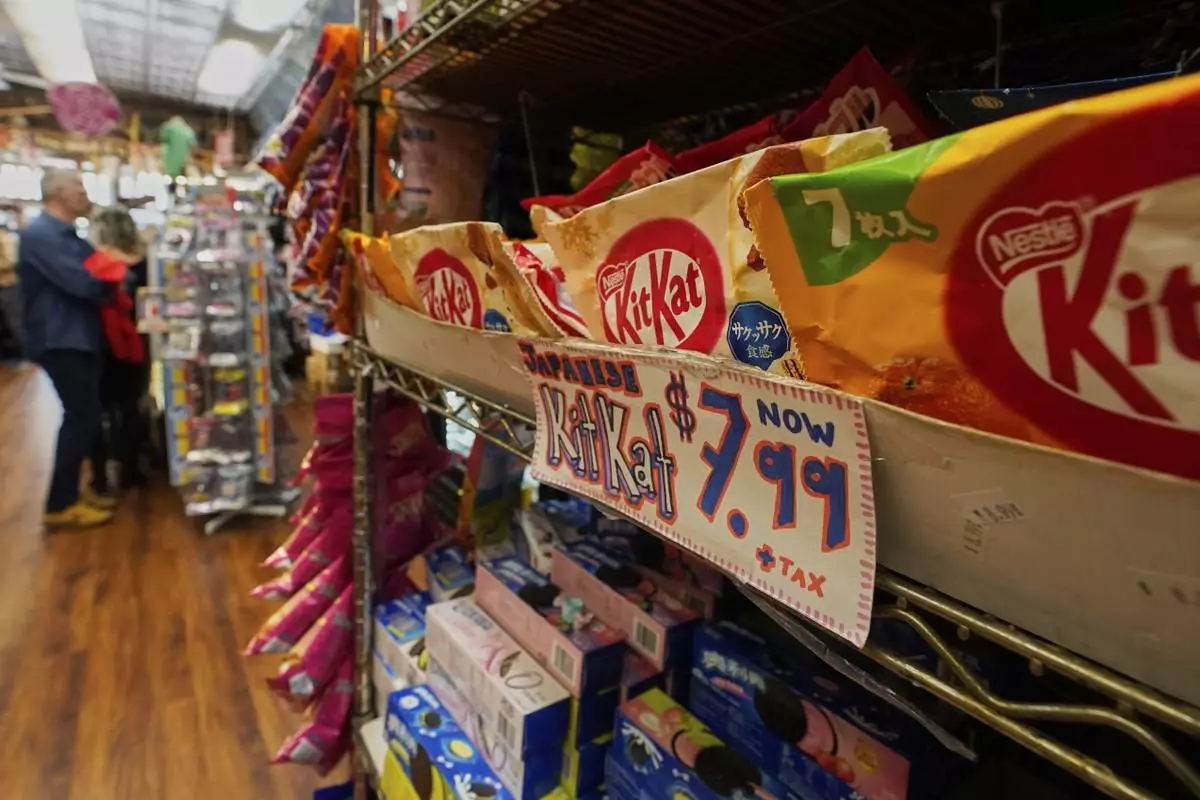
Kit Kats from Japan are displayed for sale at Economy Candy in New York's Lower East Side, Friday, April 4, 2025. (AP Photo/Richard Drew)
WASHINGTON (AP) — President Donald Trump delivered another jarring reversal in American trade policy Wednesday, suspending for 90 days import taxes he’d imposed barely 13 hours earlier on dozens of countries while escalating his trade war with China. The moves triggered a powerful stock market rally on Wall Street but left businesses, investors and America’s trading partners bewildered about what the president is attempting to achieve.
The U-turn came after the sweeping global tariffs Trump announced last week set off a four-day route in global financial markets, paralyzed businesses and raised fears the U.S. and world economies would tumble into recession.
White House press secretary Karoline Leavitt tried to characterize the sudden change in policy as part of a grand negotiating strategy. But to those outside the Trump administration, it looked like a cave-in to market pressure and to growing fears that the president’s impetuous use of import taxes — tariffs — would cause massive collateral economic damage.
“Other countries will welcome the 90-day stay of execution — if it lasts — but the whiplash from constant zig-zags creates more of the uncertainty that businesses and governments hate,” said Daniel Russel, vice president at the Asia Society Policy Institute. “The Administration’s blunt-force tactics have rattled allies, who see the sudden reversal as damage control following the market meltdown, rather than a pivot to respectful, balanced negotiations.’’
Trump’s turnaround Wednesday capped a wild week in U.S. trade policy. On Wednesday April 2 — which Trump labeled “Liberation Day’’ — the president announced plans to impose tariffs on almost every country on earth, upending the world trading system. The first of his new tariffs — a 10% “baseline’’ tax on imports from most countries — went into effect Saturday.
At midnight Wednesday, he upped the ante by slapping what he called “reciprocal’’ taxes on countries he accused of unfair trading practices and adding to U.S. trade deficits. Those are the tariffs he suspended for 90 days, saying the pause would give countries time to negotiate with him and his trade team.
There was one exception to the reprieve: He raised the tariff on Chinese imports to a staggering 125%, punishing Beijing for announcing retaliatory tariffs on the United States. Meanwhile, the 10% baseline tariffs – a substantial act of protectionism in their own right – remain in place.
Trump’s ever-changing trade war tactics — which include earlier levies on cars, steel and aluminum, and Mexico and Canada — have already done damage, forcing dazed companies to delay or cancel plans as they tried to figure out what Trump was doing and how they should respond.
Some companies temporarily laid off workers after Trump’s widespread tariffs were announced, while there were signs that many firms held off on hiring amid the widespread uncertainty the tariffs created.
Carmaker Stellantis temporarily cut 900 jobs at factories in Michigan and Indiana after production was halted at two plants in Canada and Mexico in the wake of Trump's 25% duties on imported cars.
And Cleveland-Cliffs laid off 1,200 workers at a factory in Michigan and an iron ore mine in Minnesota in response to a drop in demand from auto companies. Cleveland-Cliffs said it would resume production at the two facilities once auto production returned to the U.S.
Minutes from the Federal Reserve’s March 18-19 meeting, released Wednesday, showed that many of its policymakers said that their business contacts “reported pausing hiring decisions because of elevated policy uncertainty."
And Delta Air Lines said earlier Wednesday that demand for domestic leisure trips and corporate travel has stalled because of the uncertainty around global trade. In a conference call with investors, the company said it was cutting capacity. It also declined to provide a full-year financial forecast.
“Right now, it’s hard to know how this is going to play out, given that this is somewhat self-imposed,” Delta CEO Ed Bastian said. “I’m hopeful that sanity will prevail and we’ll move through this period of time on the global trade front relatively quickly.”
Businesses have sought greater clarity around Trump's ultimate tariff policies for weeks. It's not clear that the 90-day pause has reduced their uncertainty.
Jeff Jaisli, CEO of the New Jersey-based importer/exporter Jagro, said Trump’s Truth Social post on Wednesday had made things “even worse’’ and more confusing. He was trying to figure out which tariffs applied to which countries.
“We’re scrambling to find correct information and procedures for entries we’re processing NOW in real time,’’ he said by email. He could find no guidance on the websites of the White House or the Customs and Border Protection agency, which collects tariffs. Earlier, Jaisli called Trump's tariffs "a grenade that was thrown into the room that’s going to cause chaos.''
Trump's tariffs have set off a tit-for-tat trade war with China, the world's second-biggest economy. Even before Trump upped his taxes on China to 125%, the Chinese had set their own tariffs on the United States at 84%.
The World Trade Organization's director-general, Ngozi Okonjo-Iweala, warned that the rising tension could reduce U.S.-China merchandise trade by 80% and "severely damage the global economic outlook.”
“Of particular concern is the potential fragmentation of global trade along geopolitical lines,” she wrote in a statement late Wednesday. “A division of the global economy into two blocs could lead to a long-term reduction in global real GDP by nearly 7%.”
Citing WTO projections, she warned the negative effects could ripple through to other economies, especially developing ones. She urged countries to ensure an open global trading system and resolve differences through cooperation.
Meanwhile, U.S. companies struggled to figure out how to respond to huge levies on Chinese products they'd come to rely on.
Jessica Bettencourt is CEO of Klem’s, a third-generation store in Spencer, Massachusetts that sells everything from lawn and garden items to workwear and gifts. She said that the escalation of tariffs from China have made her stop ordering any new fourth-quarter product that is holiday, gifts or toys. She is also reconsidering any fall apparel and footwear orders that aren’t already placed.
“The worst thing is uncertainty and we have massive uncertainty,” said Jason Goldberg, chief commerce strategy officer at Publicis Groupe, a global marketing and communications company. “No one can make any moves. Everybody is trying to save as much cash and defer any unnecessary expense. People are getting laid off. Orders are getting cancelled. Expansion plans are being put on hold.”
Robert Bumsted and Anne D'Innocenzio in New York, Dee-Ann Durbin in Detroit and Jamey Keaten in Geneva contributed to this story.
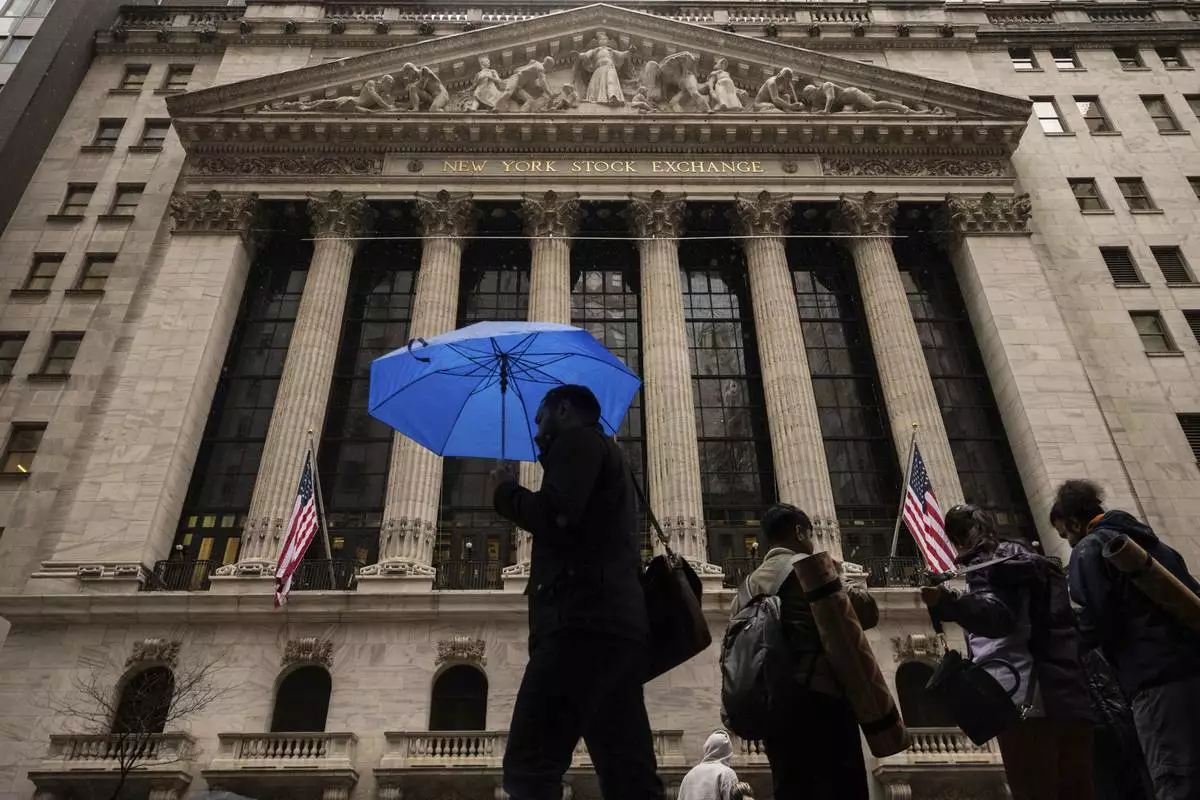
People walk past the New York Stock Exchange, Monday, April 7, 2025, in New York. (AP Photo/Yuki Iwamura)
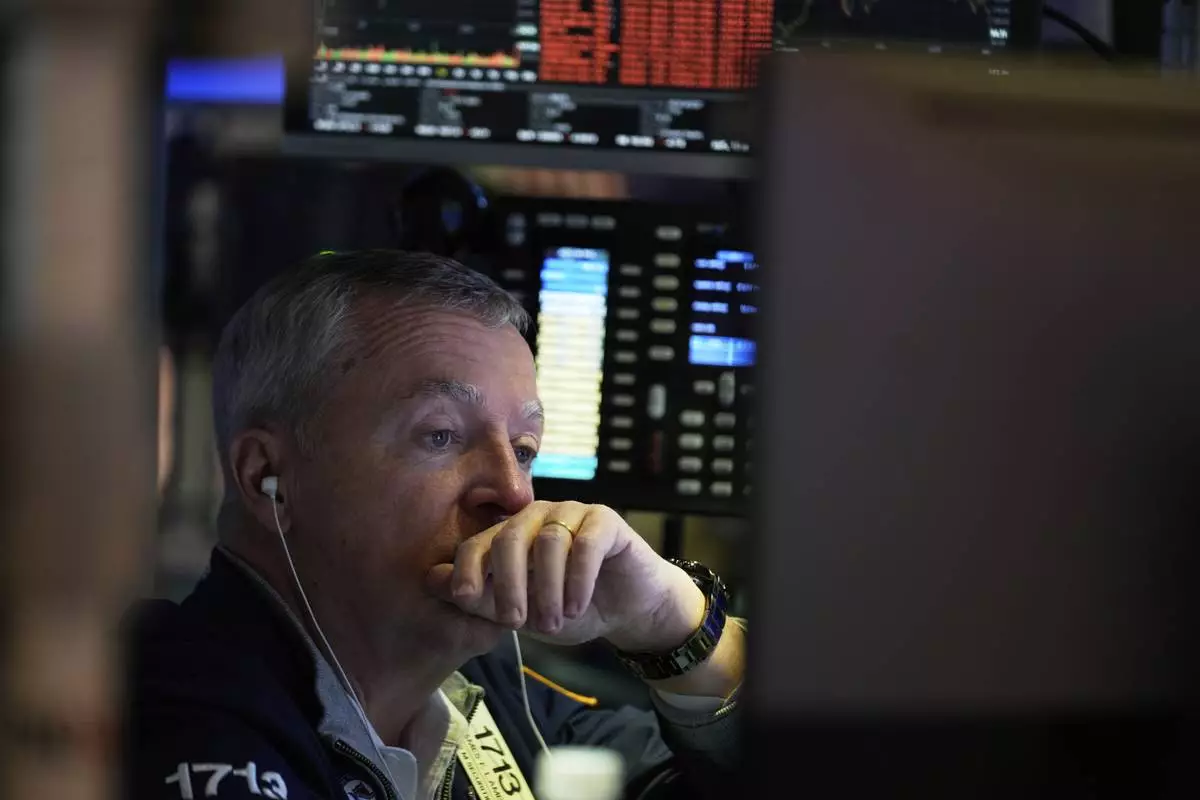
James Lamb works on the floor at the New York Stock Exchange in New York, Monday, April 7, 2025. (AP Photo/Seth Wenig)
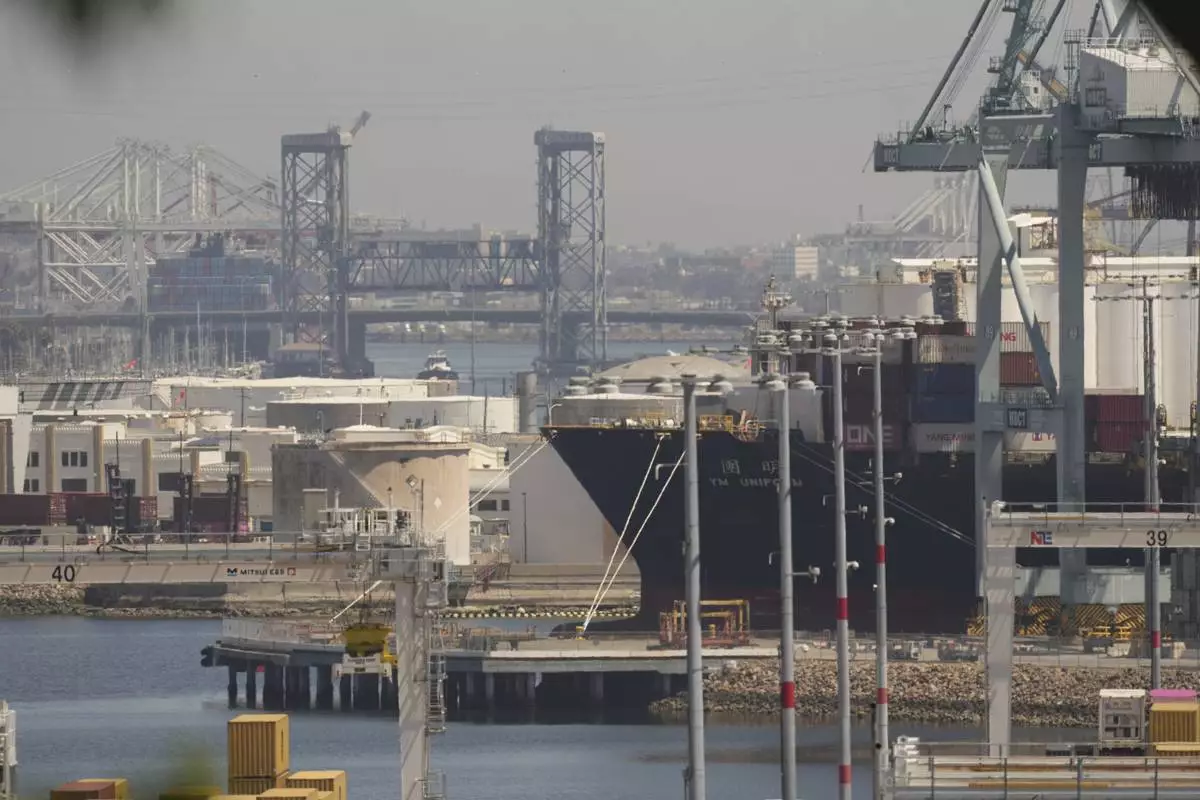
The YM Uniform container ship is docked at the Port of Los Angeles Wednesday, April 9, 2025, in Los Angeles. (AP Photo/Damian Dovarganes)
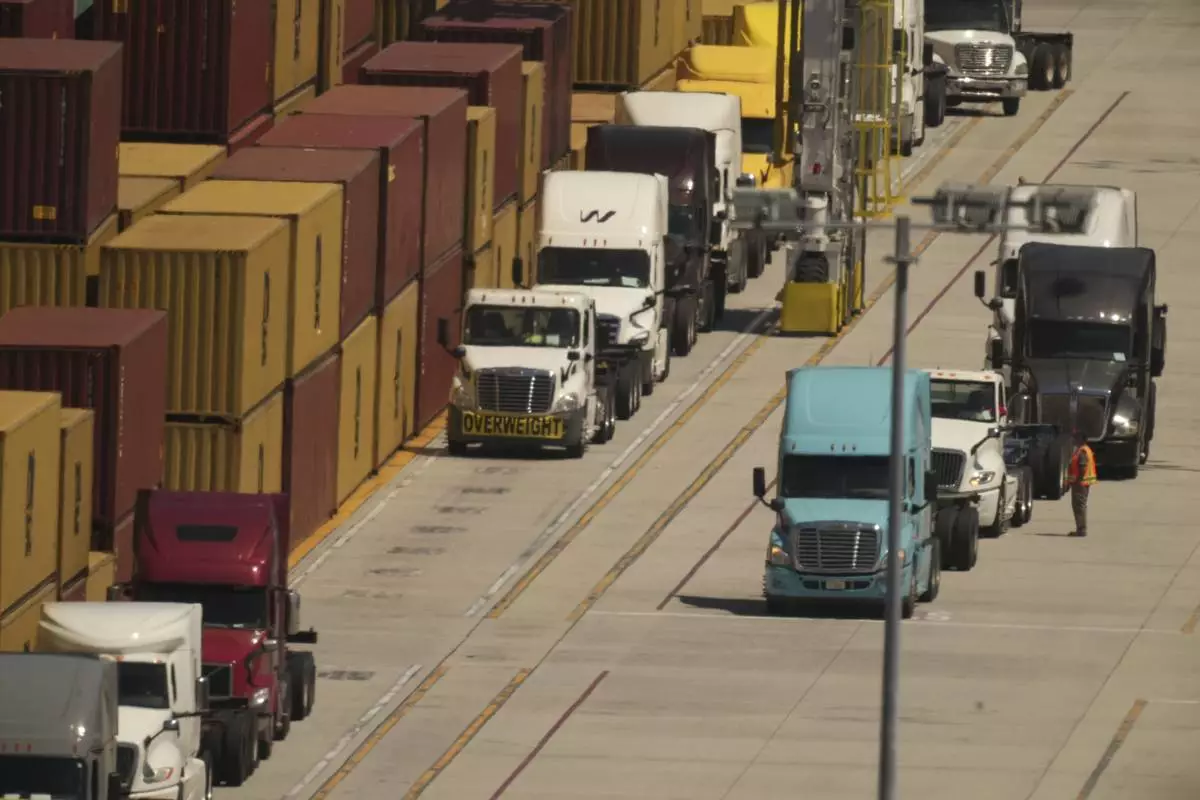
Truck await to load shipping containers at the Port of Los Angeles Wednesday, April 9, 2025, in Los Angeles. (AP Photo/Damian Dovarganes)











